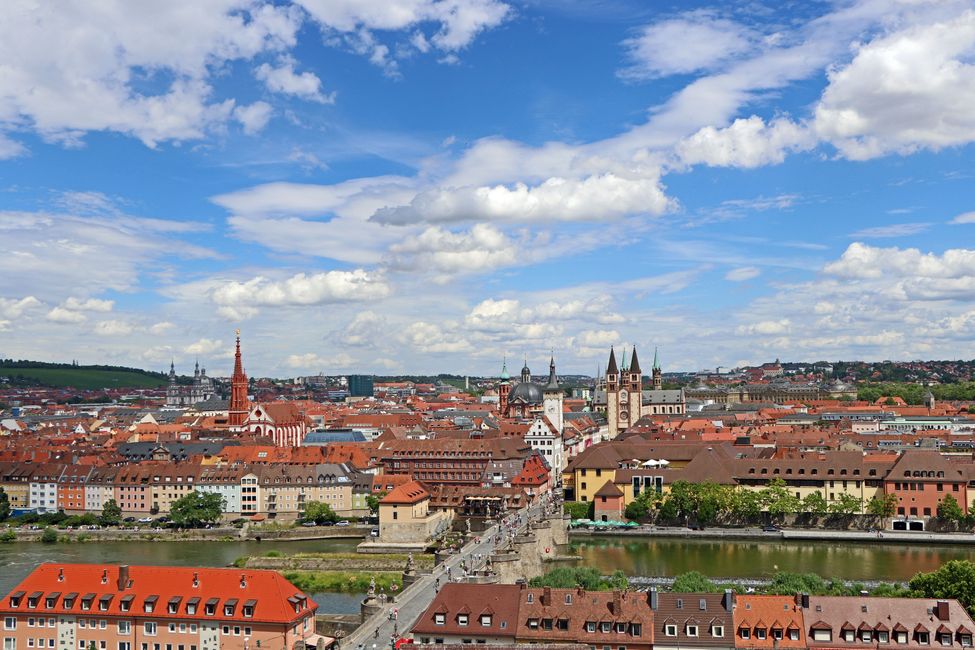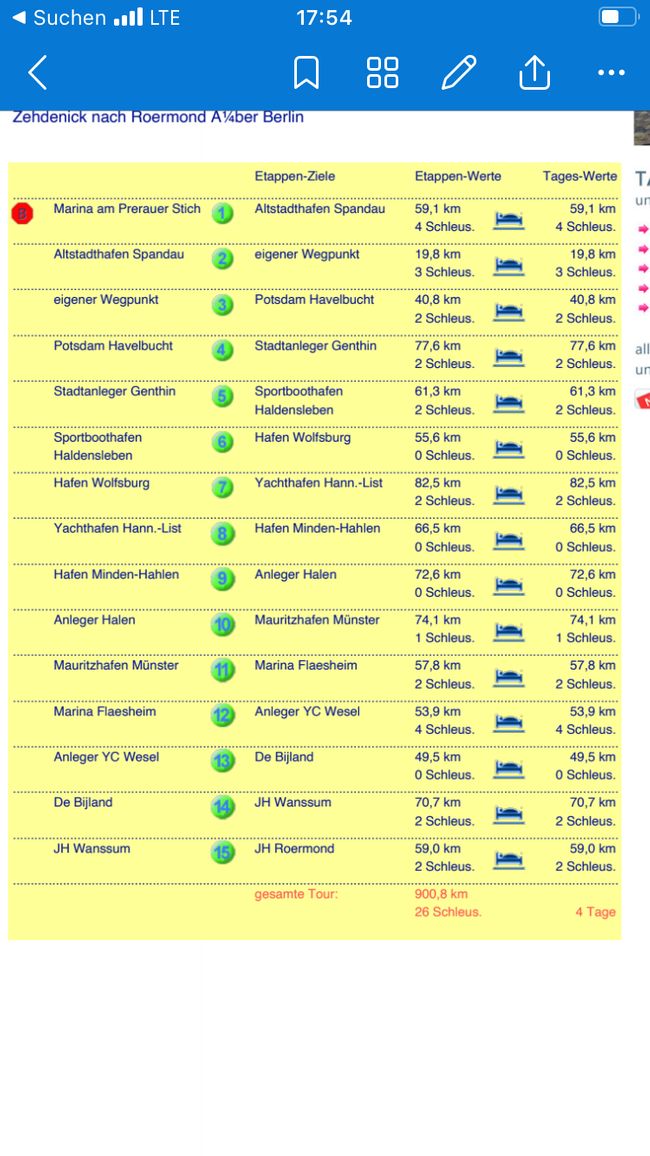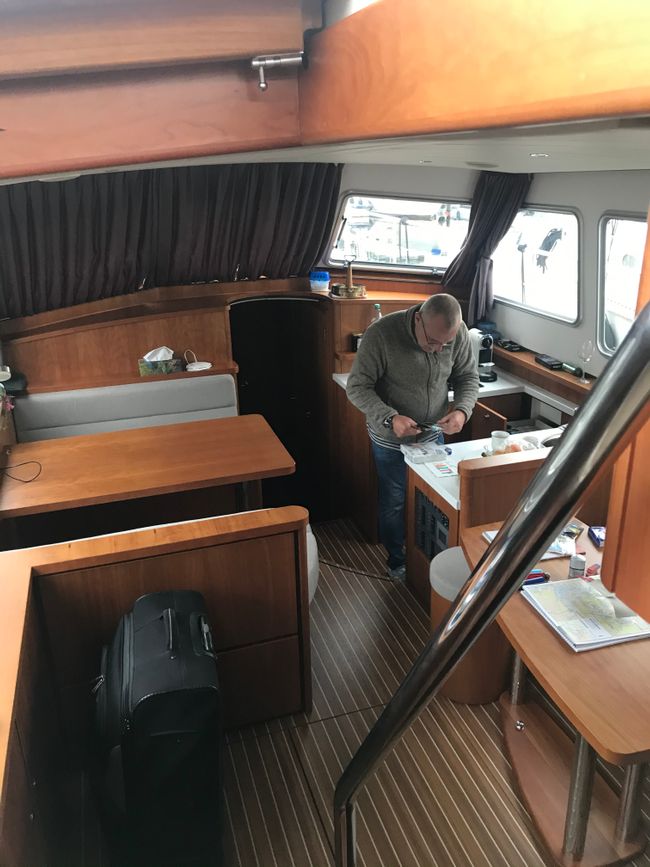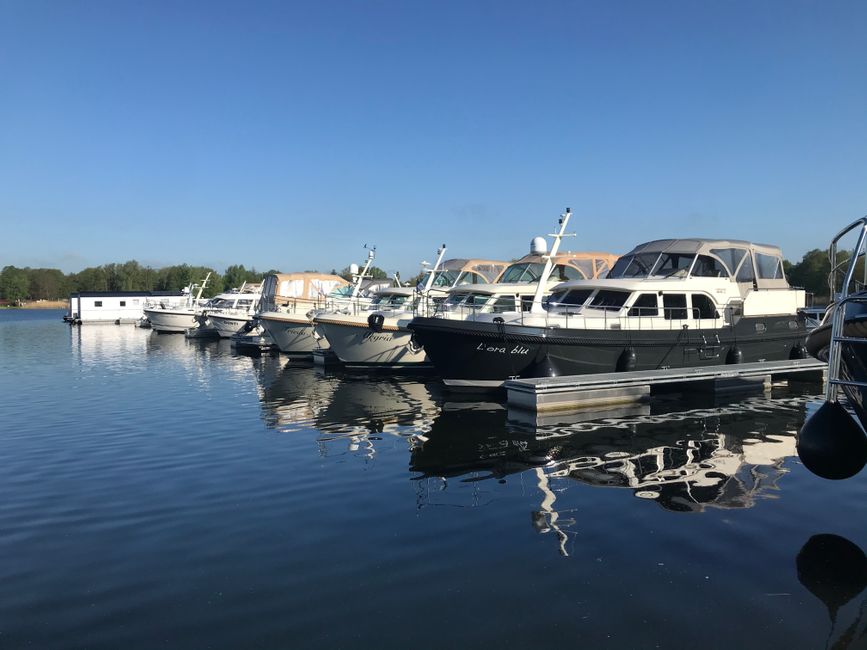
motorboot_brandenburg_niederlande
vakantio.de/motorboot_brandenburg_niederlande
Planned route
Published: 17.05.2021
Subscribe to Newsletter
Here is the approximate reverse route (from a travel report) and the navigation created by Michael with daily stages.
Across Germany by water - transfer of a Linssen 40.9 from Maasbracht to Zehdenick in August 2014 When the opportunity arose for us at the turn of the year 2013 to transfer a new Grand Sturdy 40.9 AC from Maasbracht to Zehdenick during the summer holidays in 2014, skepticism was initially the order of the day - first of all, we had to convince ourselves that it was even possible to do so by water and where exactly we would go. After some consideration and preliminary planning, curiosity about this challenge quickly won out, and the summer vacation was set. On the first day of the summer holidays in Baden-Württemberg, we set off with 2 children (9 and 6) and a fully loaded station wagon to Maasbracht. With some rest breaks and no time pressure, we had estimated about 3 weeks, which would be sufficient. Although the shipyard recommends covering the first 25 hours in Holland and coming back for a final check, this would have exceeded our time frame, so we set out towards Berlin with only 5 operating hours. New from the shipyard: Linssen GS 40.9 AC "Alegria" For logistical reasons, as long as we still had the car available, we did a major grocery and drinks shopping trip in Maasbracht. Since no deposit is charged on plastic bottles in Holland, we were able to dispose of our empty bottles as simple plastic waste during the trip without having to search for bottle return stations as pedestrians. For the first stage, we had chosen T'Leuken, where the always very friendly and helpful Linssen staff gave us the tip to prefer to moor on the left side of the campsite as a guest. Since we could only leave after noon due to all the loading and other formalities, we decided to go straight to the Heel lock and thus the bypass canal, instead of taking the more scenic route through Roermond. In Heel and the following Belfeld lock, there was a commercial ship right in front of us, which solved the problem of how to correctly register by radio at the lock. The Maas shortly before Venlo Despite the shortcut, it was already almost 6 p.m. when we arrived in T'Leuken, where the question of whether to dock on the left or right side became unnecessary - due to the holiday season, both marinas were completely full, so we went back to the Maas. At the Sambeek lock, we were just considering whether we wanted to use the upstream berth for the night when another commercial ship came and we took the opportunity to lock down with it. Just after the lock, the WV Boxmeer was marked on the map in a side arm of the Maas, and due to its remote location, we found a mooring place there even late at night and planned to leave early enough the next day to arrive at the planned destination between 4 and 5 p.m. Traffic Control of Waal Shipping near Nijmegen The next day, we went through the Maas-Waal Canal to Nijmegen, through the lock and then into the Rhine. It had rained quite heavily the week before, so the Rhine came with quite a bit of water and a decent current of 3-4 knots. Endless traffic, and the big ships still had more power reserves upstream than our little Linssen. After a short time, the good resolutions to gently break in the diesel were discarded: if you're making 6 knots through the water at 1800 rpm and only have 2 knots left against the current, it takes quite a while to make progress. Our destination for the day was De Bijland, a beautiful and well-maintained area a bit off the beaten track, which is very well developed for water sports and accordingly popular. We had a good meal on the sun terrace of the restaurant "De Hafenmeester". The next day, we continued up the Rhine to YC Wesel - in retrospect, a very tough travel day, almost 8 hours long for about 50 km, always harassed by "urgent tanks" and fast freighters, overtaking slow barges with difficulty, whose exhaust fumes were untouched by the invention of the diesel particulate filter. Rhine upstream towards Wesel We probably had a somewhat romanticized view of the Rhine journey, as the old folk song "Why is it so beautiful on the Rhine" - the question received an unexpected justification. Nevertheless, this route also had its highlights - for us, the former "Schneller Brüter" in Kalkar came as a complete surprise, which in the early 80s had gained a certain fame in southern Germany and has mutated into an amusement park: the highlight being a roller coaster rising from the cooling tower - lots of smiling faces. We passed by without docking to the chagrin of the children. In Wesel, luck was on their side, as we arrived on the last day of the fair and couldn't find any reasons not to visit in the evening. Cooling tower of the "Schneller Brüter" in Kalkar The next morning, we entered the Wesel-Datteln Canal, where the journey became much calmer and more relaxed again. 7 hours of travel and 4 locks later, we docked in the Marina Flaesheim. The forest area invites you to take a walk or jog, and the marina restaurant also offered good food at reasonable prices. Industry on the Wesel-Datteln Canal The next day, there were 2 more locks until we reached the Dortmund-Ems Canal, which we sailed to Münster, where we had planned our first break day. After the city lock in Münster, you still drive a short distance to the "Alte Fahrt" marina in Fuestrup, where we were warmly welcomed by owner Klaus Nowacki. In the meantime, the engine had almost reached the first 50 operating hours, so we wanted to have the first engine service performed by the local Volvo service partner Flores. He had been on vacation the week before and was very busy with work, but still very friendly and helpful. However, when checking the engine number over the phone, it turned out that he first had to order the appropriate oil filter, which delayed the service by one day. Since I wanted to catch up with the car anyway, the weather was still good for us, and Münster has a very nice old town with nice shops and pubs, the stop in Münster was extended by one day. Guests at MYC Lübbeke We continued on to the Mittelland Canal, where we liked to stop at MYC Lübbecke and then reached Hanover the next day. The Hanover marina is not as quiet, but central, there is a gas station, and the friendly harbor master gave us numerous tips for shopping and dining - we ate at the steakhouse "Das Ding", which is decorated with so much US folklore that it's cool again - the steaks from the grill were beyond doubt anyway. Mittelland Canal near Minden: Waterway cross over the Weser River The next morning, we joined a commercial ship to avoid a long wait before the Anderten lock with a lift of almost 15 meters. Lock chambers of this height already create a very special feeling. The next stop was Wolfsburg, where we actually wanted to go to the marina, but there was no space available for a boat our size. So we turned around and went back to the Autostadt, where we had seen that there was also a small area for sports boats at the commercial ship dock - and spending the night autonomously with a 40.9 is no problem. Sports boat dock opposite the Autostadt Now you are practically at the "back entrance" of the main train station, you can quickly get to the city center of WOB and just as quickly to the Autostadt of the VW Group via a bridge. So the next morning, we took the opportunity to pick up the car from Münster, the family visited the Autostadt, and in the afternoon we were together again. Now, wife and children had seen the advertisement for the water and laser light "fireworks" that runs centrally in the Autostadt after dark during the holidays and that we naturally wanted to watch - so after dinner, we went back to the central water pond, secured a spot, and waited. We somewhat heedlessly heard the cautious warning before the start of the show that we could get wet at our end of the pond, but (like a few hundred other visitors) didn't take it too seriously. After a cozy start with quiet music and lighting effects, considerable amount of water suddenly broke over us at this point, which hit us worse than all the other rainfalls during this trip because we weren't prepared with rain gear - within a few seconds, we were completely soaked and knew why the majority of the viewers crowded together tightly in several rows on the other side of the pond. Elbe Table in front of the Hohenwarthe lock From Wolfsburg, we then went over the Elbe Table to the Hohenwarthe lock, which had the largest lift on this trip at 18.7 m. The next part of the route towards Berlin is not yet so well developed, so we stopped shortly after Magdeburg at the WSF Burg Marina because we urgently needed fresh water. That was also the only marina where we were seriously annoyed by the mooring fee. At 38 € for the boat, crew, and water, it was more than twice as expensive as what we were used to and also significantly more expensive than in Berlin afterwards - hardly any infrastructure, no restaurant, no shop, no internet - that's quite a self-confident pricing policy. A positive counterexample was the HavelMarin in Brandenburg the next day, beautifully designed, friendly, and for half the price. The associated HavelRestaurant also deserves a recommendation. View from the Nikolaikirche, Potsdam After some consideration of how to approach the Berlin area, we decided to first go to Potsdam, which we didn't know yet. After a relatively short stage, we arrived at the marina on Lake Tiefe and were able to use the afternoon for a walk through the city. From the Nikolaikirche, you have a nice panoramic view and can see how much construction work is currently taking place here. After a good dinner in town, we returned to the marina and ended up at the cocktail beach bar, where several truckloads of sand had been delivered, which, together with the beach chairs and a balmy summer evening, provided a Caribbean caipirinha evening. On the Spree River towards downtown Berlin The next morning, we set off for Berlin and passed by the Marina Lanke, where we could make a booking for two nights over the phone. But first, we went through the Charlottenburg lock into the Spree and into the city center, which is only allowed if the ship is equipped with radio communication - so while there aren't many sports boats on the water anymore, you have to join a phalanx of Spree excursion steamers, which drive so closely behind each other that you can almost walk up the Spree with dry feet. The main train station seen from the "other" side The radio is important because the steamers prefer to turn in front of the low bridges on the Spree and announce these maneuvers to their colleagues by radio. For the novice in the area, who doesn't know the names of the bridges and ships by heart, the benefits are rather modest, as someone is practically babbling on the radio all the time - so you have to pay attention. On the recommendation of experienced Linssen drivers, we ordered our 40.9 with the short mast, with which we made it through the Spree without folding down - with the standard mast, this would not have been possible. However, we did not choose to return through the Landwehkanal, as the bridges are too low for the Linssen if you don't want to decorate the cover as well. Therefore, we turned around in front of the Mühlendamm lock and moored at the "Schiffbauerdamm" sports boat dock. From there, it is 700 m to the Brandenburg Gate, and parking with the boat is free. Free parking lot, 600m walk to the Brandenburg Gate We then invested the saved parking fees in a snack bar and had currywurst with fries as it should be at "Unter den Linden". Sports boat dock Berlin-Mitte, Schiffbauerdamm The boat trip on the Spree through Berlin, past the main train station, chancellery, parliament building to Museum Island and back is not always easy due to the heavy traffic, but still highly recommended if you have the opportunity. After driving back for a while in the evening, we stayed at the Marina Lanke, from where we took a bus to Ratha us Wilhelmstadt and then took the S-Bahn to Spandau station the next day. There the paths separated, my wife and children went to Potsdamer Platz, while I took the ICE one station to Wolfsburg to pick up the car one last time and then immediately to Zehdenick. In the evening, we didn't go to the marina restaurant a second time, which we had left the night before with half-empty stomachs but a full bill. While riding the bus, we had seen an Italian restaurant "Giardinetto" within walking distance of the marina, so we walked back full and satisfied in the evening. The next day, we then drove through the Oberhavel into the Oder-Havel Canal, and the weather had become significantly more changeable and cooler in the meantime. So in the late afternoon, we went straight into the Voss Canal and the 3 locks to Zehdenick, where we arrived relatively late but had plenty of space in the harbor at Dirk Fengler because most of the charter boats were on the way. Entry to Zehdenick With that, we reached our destination a little earlier than planned and handed over the boat the next day, after a total of 17 days of travel, 820 km of distance, and 87 hours of driving time. Overall, we refueled twice, 704 liters, which averages 8.3 l/h - with the first part to Hanover having a significantly higher average of 9.2 l/h due to the long full load trip up the Rhine, compared to the second part with an average of 7.1 l/h. Oil consumption: not measurable, although an oil change took place halfway through. There were no technical problems - many thanks to all the Linssen employees who delivered a spotless performance with the "Alegria". The boat was a Grand Sturdy 40.9 AC with 3 cabins and 2 showers and bathrooms, so there was plenty of space when traveling with just four people - it was also very well equipped with a plotter, autopilot, radio, bow and stern thruster, TV (which the children only turned on three times!) and fully furnished. All in all, it was an exciting and varied journey that we wouldn't want to miss, except for one day when we had to travel upstream on the Rhine with continuous full throttle, and we would gladly repeat it if the opportunity presents itself.
Subscribe to Newsletter
Answer

Travel reports Germany



